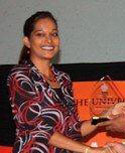

Teaching Philosophy
I am absolutely elated! At the age of 35, and teaching for about 15 years, I am ‘coming into my own’ as a consultant, researcher and of course, a teacher. After much reflection on my own doctoral studies, recent experiences with student research assistants, and the humbling pleasure of winning the Faculty’s teaching award for 2010-11, I am resolved that the best contribution I can make, and deeply desire to make, is to continue to contribute to students’ lives directly, without the burden of hierarchies. Even in my research and consultancy experiences, I believe I can provide learning experiences for young people. I have never felt so fulfilled in my teaching career!
As Dr. Chisholm of the Instructional Development Unit keeps saying, a teacher’s role is to facilitate learning experiences. I wish to add that teachers can act as a transitional object in this facilitation process, serving to provide the psychological safety and comfort needed for deep engagement in learning processes which, based on our current historical and social context, may be anxiety-provoking. As this transitional object, a teacher may need to play many other roles: leaders, motivators, coaches and confidence boosters. It is my sincerest belief that a motivated, efficacious student WILL learn (all else being equal), and that both the lecturer’s authenticity and ability to create a safe, comfortable environment are key to exciting, enjoyable learning.
One of the marks of a great learning experience is when both lecturer and student feel a deep connection to the topics and have generated ideas out of the course materials through lively and engaging discussion in the class itself. With a “Let’s talk about this” approach, a skillful lecturer can both deliver sufficient knowledge and stimulate thinking and interest. In terms of being fulfilling, I believe for the first time that I am deeply connected to the topics I teach, as well as the students’ education in these topics. This has allowed me to extend myself very, very comfortably in discussions, and I believe has engaged both the minds and hearts of my students.
A lecturer must master the content area before he can think about the best delivery methods. At the university level, a lecturer should prepare a topic in a way that demonstrates analysis, synthesis and critique of the material. Part of the lecturer’s responsibility is to present the essential points for understanding the concept or topic, enough for the student to exploit that knowledge, but also in a way that directs the student to further independent exploration. Practical application of theoretical information, using relatable and context-specific examples, goes a tremendous way in helping students to think critically.
Armed with theoretical knowledge and practical examples, the lecturer also needs to be skilled in delivery and designing assessments to evaluate learning. Innovation and creativity are key! I believe a ‘trial and error’ approach, if done systematically, yields the best practices over time. The same variability applies when considering how best to evaluate a student’s progress, and can be quite enjoyable for the lecturer as well. However, guidance in the moment is also very important and lecturers must therefore provide students with learning goals and objectives for each topic area covered in a session. Given the nature of the Social Sciences, I also believe that a general framework for lecture delivery may include a ‘claims-reasons-evidence’ format. Where topics may be highly abstract, this approach may make it easier for students to grasp what a theory is, and how it is supported or not supported, both logically and empirically, as well as in developing their own arguing skills.
Taking all the above into consideration, my preparation for a lecture involves extensive reading on the topic for delivery and discussion, finding practical examples, videos, songs, photographs, or designing other teaching aids, to stimulate interest and familiarity, and to exploit different learning modes. I direct questions to the students constantly, to help them analyze the content being presented. In preparing the tutorials, I may utilize group presentations, mini open-book tests, essay practice, discussion and competitions, each of which is associated with a small percentage of their final grade. In this way, both external and internal motivation should be available for learning. For coursework assessments, I have made use of ‘learning portfolios’ or ‘reflections’, peer feedback and short academic papers. For all pieces of coursework students receive, for the most part, regular and frequent feedback which assists them in evaluating their own progress throughout the term.
At the graduate level, I have designed and carried out mock consultancy exercises. These usually involve groups of students who take on the role of consultants for organizational learning and motivation services. Through the interactions with participating company representatives and the group members themselves, students gain invaluable experience about the applications of their ‘book work’ to the real world.
I am resolved that teaching is my main contribution, and look forward to growing, experimenting, reflecting, sharing, building and learning about the business of learning!
(Parts of this teaching philosophy are taken from my 2010 and 2011 philosophy statements).